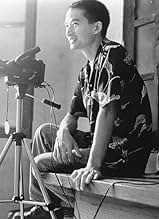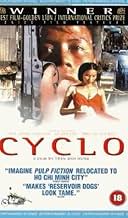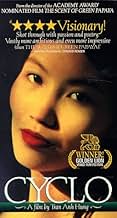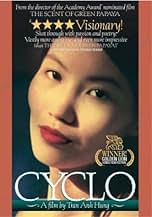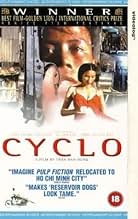AVALIAÇÃO DA IMDb
7,1/10
5,8 mil
SUA AVALIAÇÃO
Adicionar um enredo no seu idiomaWhen a poor bicycle-taxi driver has his cyclo stolen, he is forced into a life of crime. Meanwhile, his sister becomes a prostitute.When a poor bicycle-taxi driver has his cyclo stolen, he is forced into a life of crime. Meanwhile, his sister becomes a prostitute.When a poor bicycle-taxi driver has his cyclo stolen, he is forced into a life of crime. Meanwhile, his sister becomes a prostitute.
- Prêmios
- 4 vitórias e 1 indicação no total
Tony Leung Chiu-wai
- Poet
- (as Tony Chiu Wai Leung)
Nu Yên-Khê Tran
- Sister
- (as Tran Nu Yên-Khê)
Thinh Trinh
- Foot Fetishist
- (as Trinh Thinh)
Avaliações em destaque
8=G=
"Cyclo" tells of an impoverished Saigon family whose son (Cyclo) turns to crime and whose daughter turns to prostitution as a matter of economic survival. A magnificent accomplishment in cinematography, there's little new to be found in the film's somewhat muddled story which is told almost exclusively with the camera as Oscar winning director Anh Hung Tran demonstrates mastery over the lens in delivering this tapestry of pictures which captures the beauty and blight of a bustling Vietnamese city. Not for everyone, "Cyclo" will play best with those who appreciate true artistry in film.
"Cyclo" is one of the greatest independent movies ever made. Vietnamese Auteur Tran Anh Hung shows how by accident violence becomes dominant in the life of a poor, young worker toiling in the streets of Saigon. Brilliantly shot with sometimes shocking and very intimate close-ups of violence and perversion, this movie deserves more attention. Besides "Cyclo" is also a documentary about the sad daily street life in giant third world cities and the permanent fight to survive.
The camera-work in this film is unbelievable. I haven't seen many films from Vietnam but this one is undoubtedly the best. Cinematography is top notch. Some of the photography is mind-boggling. Xich lo is about a young bicycle taxi driver from a poor family who becomes involved in gang activities after his taxi is stolen and his options are limited. The 123 minutes of the film give time for good character development. The gang's lieutenant, Poet, is a ruthless criminal who rarely speaks and is troubled his bad childhood and a recurring nosebleed problem. Madame is the wise leader with a retarded son, Fishmouth. Every character in the story is human, each with their own problems. I am not familiar with the filmmakers' other works so I don't know if there are any political or social messages contained in this film, but one shot of a wealthy, clean development late in the film is shown in sharp contrast to the dirty and violent world that we see in the rest of the film.
My only criticism of this is the pace.. it dragged slightly at a few points, and these seemed to be included in the final cut for the poetry and songs contained in them. I give this film a 10 in the end. Highly recommended.
My only criticism of this is the pace.. it dragged slightly at a few points, and these seemed to be included in the final cut for the poetry and songs contained in them. I give this film a 10 in the end. Highly recommended.
Another reviewer correctly pointed out this film's weakness: the script. The story starts out strong then about a third of the way through it hops the track.
After that, if you can tell what is going on and above all WHY, you're pretty good--or friends with the author.
The government of the People's Republic of Vietnam cooperated in making this film for, I suspect, political reasons. Specifically, to paint the Chinese and China in a bad light. The setting is Cholon, the Chinatown section of the old city of Saigon, the former capital of the Republic of (South) Vietnam. Saigon is now Ho Chi Minh City of course and the Chinese are almost all gone, fled from the persecution that preceded and followed the 1979 Sino-Vietnamese border war. Even in 1994 when the picture was shot relations between China and Vietnam were tense. This movie depicts Cholon as a center of drug trafficking, vice, thievery and murder in which the U.S. dollar is the most desired currency.
The camera work by Frenchman Benoit Delhomme is pure artistry. Production values are high. The leading lady Tran Nhu Yen-Khe is absolutely riveting--her exotic beauty the best thing by far about the picture. There are some interesting backgrounds, particularly a short interlude where Poet, played by Hong Kong actor Tony Leung, and Sister (Ms. Yen-Khe) escape the filthy and impoverished inner city and spend a day in the countryside. It is no accident I am sure that some of the French architecture that still stands is featured.
The minor roles are convincingly played, the characters sharply defined for all their brief appearances. It is at the center that the film's weaknesses are most evident.
After that, if you can tell what is going on and above all WHY, you're pretty good--or friends with the author.
The government of the People's Republic of Vietnam cooperated in making this film for, I suspect, political reasons. Specifically, to paint the Chinese and China in a bad light. The setting is Cholon, the Chinatown section of the old city of Saigon, the former capital of the Republic of (South) Vietnam. Saigon is now Ho Chi Minh City of course and the Chinese are almost all gone, fled from the persecution that preceded and followed the 1979 Sino-Vietnamese border war. Even in 1994 when the picture was shot relations between China and Vietnam were tense. This movie depicts Cholon as a center of drug trafficking, vice, thievery and murder in which the U.S. dollar is the most desired currency.
The camera work by Frenchman Benoit Delhomme is pure artistry. Production values are high. The leading lady Tran Nhu Yen-Khe is absolutely riveting--her exotic beauty the best thing by far about the picture. There are some interesting backgrounds, particularly a short interlude where Poet, played by Hong Kong actor Tony Leung, and Sister (Ms. Yen-Khe) escape the filthy and impoverished inner city and spend a day in the countryside. It is no accident I am sure that some of the French architecture that still stands is featured.
The minor roles are convincingly played, the characters sharply defined for all their brief appearances. It is at the center that the film's weaknesses are most evident.
First of all I was blown away by the strong visual quality of Cyclo. Directed by the talented Ahn-Hung Tran, a Vietnamese/French director. This is his second film after the critically acclaimed `Scent of a Green Papaya'. The film looks and feels like a visual poem, and you can't do anything but be awestricken by the sheer intensity and power of the images and their composition that are expressed towards you. Even if their exact meaning isn't always clear to us.
In visual terms I would say that the director borrows more from photographers and video artists than other films. What emerges from this is a bold and powerful film. But unlike his fellow film director such as Wong Kar-Wai (In the Mood for Love, Fallen Angels), whose films can sometimes give you the same feel as leafing through a hip photo magazine. Tran's film is more collected, even though it can be made a point out of the plot at times being a bit sketchy.
The story circles around a young cyclo (played by Le Van Loc), a bicycle taxi driver (pedicab), his older sister and her lover / ex-lover the local hoodlum, know as the poet ( played by Hong Kong star Tony Leung). We don't learn any of their real names; even the film credits them as the cyclo, the sister, the poet, the grandfather, the madam etc.
The cyclo has lost both his parents and is currently living with his siblings and his grandfather. The film gives us a unique view of the contrasts and the poverty of Saigon. Everyone in this household has to work, in order to make ends meet. The cyclo drives his pedicab looking for passengers. His younger sister shines shoes after school. The beautiful older sister cooks and carries water from the marked, and even the old grandfather repairs tyres.
The chain of events starts rolling when the cyclo gets jumped by rivals who steal his pedicab and beat him up. The cyclo who was employed by the local gang boss, the madam, is now forced into taking up petty crimes, under her sponsorship to pay for his cab. But instead of returning to a normal life, he is pressured by the madam's gang led by the silent gangster the poet, to commit even more violent crimes, on madams behalf.
The poet however, is at the same time living a second life as a pimp, under which guise he recruits the cyclos elder sister (presumably because she and her family need the money). There is also a clear indication that she and the poet are either lovers or have been so.
But trying to follow or find the plot of the film is missing the whole point of this film. Events occur suddenly for no direct reason, while other times, events don't occur as you as a viewer expect them to. The film follows a dynamic structure reflecting the human spontaneity. Events are sometimes difficult to make out, because the director clearly doesn't believe in feeding us information with a spoon. It's liberating to watch a film that isn't afraid of its audience, and deliberately has a storytelling that leaves much up to our imagination and interpretation of event. There is such room for speculation, because Tran leaves a whole continent of emotions and information unexposed.
Let me just point out that this is not a bad thing in anyway. We are raised upon a tradition of films that force-feed us their purpose. Formula based clichés where you know where the film is going and what's going to happen after watching 10 min of it. What Ahn-Hung Tran does is both daring and plausible: breaking new ground and expanding our horizons.
As I mentioned, that trying to follow the plot is to miss the point of this film. It reminds me of French new wave aesthetics and the work by John Cassavetes. While most films and their characters are more about doing instead of being, this film does the direct opposite. It seems like the story is serving the purpose of exposing a distinct character emotions, instead of the western plot driven stories, where characters serve as devices to push the plot forward.
Tran has a great eye for visual composition and picking out details he want to show. The films story could easily have turned into something uninteresting and shallow. But the attention the right detail along with the decision to show consequences of situations instead of action and confrontation makes this a unique insight of human nature.
The main characters are all mostly silent throughout the film. This strengthens the feeling of them being almost passive accepting of the choices pressed upon them. Because the cyclo, his sister and the poet are all in one way or another force to do what they're doing, either by each other or by their environment. With this minimal amount of dialog, the majority of the scenes are more dependant of the characters actions or more: their reactions. Their expressions and body language conveys their desires and torments, without ever becoming sentimental.
Ahn Hung Tran's storytelling suits the exquisite minimalist approach the cinematographer Benoit Delhomme turns toward the material. The films fixation with fluids is also quite interesting choice. All kind of fluids play a visual and symbolic role throughout the entire film: water, mud, sweat, paint, even urine and blood. Everything ads to the visual flow of the film.
Evoking an incredible atmosphere of chaos, helter-skelter activity that seems to follow no law, the strength of cyclo lies in its imagery. Stunning colours and cascade of metaphors, on many different levels, constructs a coherent picture of the world. The main story is regularly intertwined by photomontages from Saigon: everything from the city streets of Saigon, or a montage of all the residents of a particular block, classroom of children singing Vietnamese songs. And a quite surreal funny scene of a helicopter carrier that tips over with its military helicopter, in the middle of heavy street traffic. Everything is connected with a kind of dream logic that's hard to define, where things just fit together even if they logically shouldn't.
The film is a beautiful daring triumph, which isn't afraid of its audience. It will make you reflect over it long after you have seen it. And isn't that what all good art should do ?
In visual terms I would say that the director borrows more from photographers and video artists than other films. What emerges from this is a bold and powerful film. But unlike his fellow film director such as Wong Kar-Wai (In the Mood for Love, Fallen Angels), whose films can sometimes give you the same feel as leafing through a hip photo magazine. Tran's film is more collected, even though it can be made a point out of the plot at times being a bit sketchy.
The story circles around a young cyclo (played by Le Van Loc), a bicycle taxi driver (pedicab), his older sister and her lover / ex-lover the local hoodlum, know as the poet ( played by Hong Kong star Tony Leung). We don't learn any of their real names; even the film credits them as the cyclo, the sister, the poet, the grandfather, the madam etc.
The cyclo has lost both his parents and is currently living with his siblings and his grandfather. The film gives us a unique view of the contrasts and the poverty of Saigon. Everyone in this household has to work, in order to make ends meet. The cyclo drives his pedicab looking for passengers. His younger sister shines shoes after school. The beautiful older sister cooks and carries water from the marked, and even the old grandfather repairs tyres.
The chain of events starts rolling when the cyclo gets jumped by rivals who steal his pedicab and beat him up. The cyclo who was employed by the local gang boss, the madam, is now forced into taking up petty crimes, under her sponsorship to pay for his cab. But instead of returning to a normal life, he is pressured by the madam's gang led by the silent gangster the poet, to commit even more violent crimes, on madams behalf.
The poet however, is at the same time living a second life as a pimp, under which guise he recruits the cyclos elder sister (presumably because she and her family need the money). There is also a clear indication that she and the poet are either lovers or have been so.
But trying to follow or find the plot of the film is missing the whole point of this film. Events occur suddenly for no direct reason, while other times, events don't occur as you as a viewer expect them to. The film follows a dynamic structure reflecting the human spontaneity. Events are sometimes difficult to make out, because the director clearly doesn't believe in feeding us information with a spoon. It's liberating to watch a film that isn't afraid of its audience, and deliberately has a storytelling that leaves much up to our imagination and interpretation of event. There is such room for speculation, because Tran leaves a whole continent of emotions and information unexposed.
Let me just point out that this is not a bad thing in anyway. We are raised upon a tradition of films that force-feed us their purpose. Formula based clichés where you know where the film is going and what's going to happen after watching 10 min of it. What Ahn-Hung Tran does is both daring and plausible: breaking new ground and expanding our horizons.
As I mentioned, that trying to follow the plot is to miss the point of this film. It reminds me of French new wave aesthetics and the work by John Cassavetes. While most films and their characters are more about doing instead of being, this film does the direct opposite. It seems like the story is serving the purpose of exposing a distinct character emotions, instead of the western plot driven stories, where characters serve as devices to push the plot forward.
Tran has a great eye for visual composition and picking out details he want to show. The films story could easily have turned into something uninteresting and shallow. But the attention the right detail along with the decision to show consequences of situations instead of action and confrontation makes this a unique insight of human nature.
The main characters are all mostly silent throughout the film. This strengthens the feeling of them being almost passive accepting of the choices pressed upon them. Because the cyclo, his sister and the poet are all in one way or another force to do what they're doing, either by each other or by their environment. With this minimal amount of dialog, the majority of the scenes are more dependant of the characters actions or more: their reactions. Their expressions and body language conveys their desires and torments, without ever becoming sentimental.
Ahn Hung Tran's storytelling suits the exquisite minimalist approach the cinematographer Benoit Delhomme turns toward the material. The films fixation with fluids is also quite interesting choice. All kind of fluids play a visual and symbolic role throughout the entire film: water, mud, sweat, paint, even urine and blood. Everything ads to the visual flow of the film.
Evoking an incredible atmosphere of chaos, helter-skelter activity that seems to follow no law, the strength of cyclo lies in its imagery. Stunning colours and cascade of metaphors, on many different levels, constructs a coherent picture of the world. The main story is regularly intertwined by photomontages from Saigon: everything from the city streets of Saigon, or a montage of all the residents of a particular block, classroom of children singing Vietnamese songs. And a quite surreal funny scene of a helicopter carrier that tips over with its military helicopter, in the middle of heavy street traffic. Everything is connected with a kind of dream logic that's hard to define, where things just fit together even if they logically shouldn't.
The film is a beautiful daring triumph, which isn't afraid of its audience. It will make you reflect over it long after you have seen it. And isn't that what all good art should do ?
Você sabia?
- CuriosidadesMade and banned in Vietnam. Criticised as too 'westernised' in its gritty and unrelenting portrayal of urban poverty in the country. The film has nevertheless received international acclaim, winning the Golden Lion Award in Venice in 1995.
- ConexõesReferenced in Romance no Parque (1998)
- Trilhas sonorasCreep
Written by Albert Hammond, Mike Hazlewood, Thom Yorke, Jonny Greenwood, Colin Greenwood, Ed O'Brien and Phil Selway
Performed by Radiohead
Principais escolhas
Faça login para avaliar e ver a lista de recomendações personalizadas
- How long is Cyclo?Fornecido pela Alexa
Detalhes
- Data de lançamento
- Países de origem
- Central de atendimento oficial
- Idioma
- Também conhecido como
- O Ciclista
- Locações de filme
- Empresas de produção
- Consulte mais créditos da empresa na IMDbPro
Bilheteria
- Faturamento bruto nos EUA e Canadá
- US$ 284.692
- Fim de semana de estreia nos EUA e Canadá
- US$ 38.109
- 4 de ago. de 1996
- Faturamento bruto mundial
- US$ 284.692
Contribua para esta página
Sugerir uma alteração ou adicionar conteúdo ausente

Principal brecha
By what name was Entre a Inocência E o Crime (1995) officially released in India in English?
Responda

